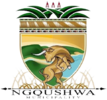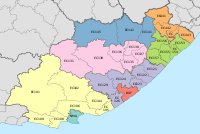Ngqushwa Local Municipality
Ngqushwa | |
|---|---|
 Location in the Eastern Cape | |
| Coordinates: 33°12′S 27°07′E / 33.200°S 27.117°E | |
| Country | South Africa |
| Province | Eastern Cape |
| District | Amathole |
| Seat | Peddie |
| Wards | 13 |
| Government | |
| • Type | Municipal council |
| • Mayor | Mnikelo Tempile Siwisa (ANC) |
| • Speaker | Nombuyiselo Ethelina Magingxa (ANC) |
| • Chief Whip | Fumanekile Phumaphi (ANC) |
| Area | |
| • Total | 2,241 km2 (865 sq mi) |
| Population (2011)[2] | |
| • Total | 72,190 |
| • Density | 32/km2 (83/sq mi) |
| Racial makeup (2011) | |
| • Black African | 99.2% |
| • Coloured | 0.2% |
| • Indian/Asian | 0.1% |
| • White | 0.4% |
| First languages (2011) | |
| • Xhosa | 94.7% |
| • English | 2.6% |
| • Other | 2.7% |
| Time zone | UTC+2 (SAST) |
| Municipal code | EC126 |
Ngqushwa Municipality (Xhosa: uMasipala wase Ngqushwa) is a local municipality within the Amatole District Municipality, in the Eastern Cape province of South Africa.
Main places
[edit]The 2001 census divided the municipality into the following main places:[3]
| Place | Code | Area (km2) | Population |
|---|---|---|---|
| Amahlubi | 21501 | 25.88 | 1,095 |
| Amambalu | 21502 | 64.29 | 144 |
| Bhele | 21503 | 71.60 | 5,626 |
| Dabi | 21504 | 9.96 | 1,010 |
| Glenmore | 21505 | 13.18 | 1,373 |
| Hamburg | 21506 | 3.30 | 193 |
| Imidushane | 21507 | 345.41 | 15,216 |
| Imiqayi | 21508 | 176.73 | 14,947 |
| Mareledwana | 21509 | 243.17 | 10,774 |
| Mhala | 21510 | 101.29 | 5,355 |
| Mphekweni | 21511 | 0.28 | 27 |
| Msuthu | 21512 | 70.89 | 4,515 |
| Ngqushwa | 21513 | 158.71 | 233 |
| Njokweni | 21514 | 86.22 | 4,667 |
| Peddie Part 1 | 21515 | 653.47 | 10,791 |
| Peddie Part 2 | 21517 | 9.77 | 3,696 |
| Tyefu | 21516 | 211.15 | 4,583 |
Politics
[edit]The municipal council consists of twenty-three members elected by mixed-member proportional representation. Twelve councillors are elected by first-past-the-post voting in twelve wards, while the remaining eleven are chosen from party lists so that the total number of party representatives is proportional to the number of votes received. In the election of 1 November 2021 the African National Congress (ANC) won a majority of eighteen seats on the council. The following table shows the results of the election.[4]
| Party | Ward | List | Total seats | |||||
|---|---|---|---|---|---|---|---|---|
| Votes | % | Seats | Votes | % | Seats | |||
| African National Congress | 13,752 | 74.66 | 11 | 14,561 | 81.29 | 7 | 18 | |
| Economic Freedom Fighters | 1,849 | 10.04 | 0 | 2,245 | 12.53 | 3 | 3 | |
| Independent candidates | 2,057 | 11.17 | 1 | 1 | ||||
| Democratic Alliance | 448 | 2.43 | 0 | 517 | 2.89 | 1 | 1 | |
| African Transformation Movement | 247 | 1.34 | 0 | 355 | 1.98 | 0 | 0 | |
| Independent South African National Civic Organisation | 67 | 0.36 | 0 | 235 | 1.31 | 0 | 0 | |
| Total | 18,420 | 100.00 | 12 | 17,913 | 100.00 | 11 | 23 | |
| Valid votes | 18,420 | 97.86 | 17,913 | 95.27 | ||||
| Invalid/blank votes | 403 | 2.14 | 889 | 4.73 | ||||
| Total votes | 18,823 | 100.00 | 18,802 | 100.00 | ||||
| Registered voters/turnout | 35,846 | 52.51 | 35,846 | 52.45 | ||||
References
[edit]- ^ "Contact list: Executive Mayors". Government Communication & Information System. Archived from the original on 14 July 2010. Retrieved 22 February 2012.
- ^ a b c "Statistics by place". Statistics South Africa. Retrieved 27 September 2015.
- ^ Lookup Tables - Statistics South Africa
- ^ "Election Result Table for LGE2021 — Ngqushwa". wikitable.frith.dev. Retrieved 25 February 2022.


